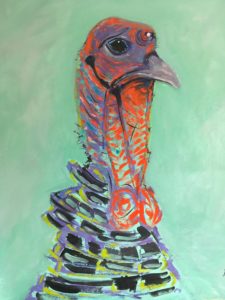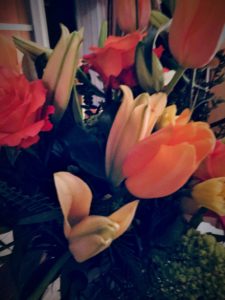To be truthful, over the past decade or so my Dad and I spoke only a few times a year. The obvious ones, of course, Christmas and birthdays, and the New Year. For those, he liked to line the family up together so that everyone could take a turn of a few seconds to speak and say whatever was necessary or required or opportune. This habit dated back to the days when telephone calls were expensive and should be kept short. He wanted it to be speedy and unproblematic.
By then my father had another family, and I had taken some kind of second seat in the theater of affections, and of course, the fact that I was in my forties, and then my fifties, by then meant my life was supposed to be well on its way without him. At home he had a son in his twenties who needed much more guidance than I did, and with him and his wife my father shared a daily life of intimacy and dinners and lunches and conversations that I no longer shared.
With me, on the other hand, the calls had in some way come to feel more like obligations than spontaneous expressions of love, and the expressions of real concern or real conversations had become more and more threadbare. I could not call and cry with him about the loss of love and so much more, and, in fact, the more my life became difficult, which in recent years it had become, the more threadbare the conversations became because my father had never been good at making things better that he could not make better. I could not ask of him, even silently, what he could not give, perfectly.
Hence, he turned away from me and my life, and, through time, living apart and compartmentalizing Sybil’s problems had caused us to lose intimacy. I no longer knew how to trust my feelings to him; I was not sure that I was not bothering him, or boring him. I felt that I had lost my Dad.
But one thing we could talk about — along with other intellectual things — and that, in fact, had become our happy place of exchange, was art. I knew I could ask about art without threatening him, without demanding anything of him that he was not willing to give, and, in fact, in asking I ennobled him. And he felt ennobled and competent and in his space. Safe, away from emotion.
Of the mind.
My father had painted as a young man, and studied art intensely, and of course, art was the first love of his life and, as it happened with my father, he knew a great deal about it, so he followed my evolution as a painter with – well, I am not sure with what.
The first couple of years after I started painting he did not come to Charleston – I went to Miami to visit – and so he did not see my work. Then, he came a few years into my painting, and my pieces were all over my house, and I was so nervous that he would come in and dismiss it or not like it or think it was all stupid. He had always been so critical, and I was enormously agitated and concerned.
Instead, after sitting for a while in the living room talking about this or that, he got up and made the rounds of the house and looked at my paintings — and I can see him now looking and evaluating as the professor and discerning person he was — walking around the room, looking, gathering some sense of what I was doing … And I knew from his countenance that I was doing something worth evaluating, though my paintings were all of birds, birds, birds — chickens and roosters. Nothing that he could particularly relate to, or care about. I held my breath, and his response was a surprise, considering that he was a hyper-critical Mies van der Rohe architect and former disciple.
But I understand now that I underestimated my father as a mind, his spirit, and his appreciation for art and what art means.
Or perhaps I underestimated him as a father. I had lost confidence in him as a father, and perhaps in myself as a person in his light.
Thereafter he started giving my work serious weight, and at some point he began to take true interest in what I was doing. He asked for pictures, and he started saying that I was growing and that my sense of the animals I was painting struck something deep and meaningful and moving, and that — that exact thing — mattered a great deal in art. It was about the feeling. The technique you can learn, he said, and you will learn if you have the passion and the discipline.
And I worked at it, every day, with his voice in the background.
And slowly through time art—my work—became the territory that we shared. It was the place where I turned to see if my Dad was paying attention to me anymore. If I had not been forgotten.
And, in fact, art opened the gates for other places, and on occasion of discussing a painting of mine we would veer off into territory that made me think that I could share my Dad again. That I could have a piece of my Dad again. We talked about books, and articles, and artists, and architecture.
Of course, it did not compensate for everything else. I missed my father deeply, the way I had known him before my parents’ divorce. A second family makes everything different—that and distance. Through time I felt like I had become a shadow of what I had been as a child in his life, and over time it compounded itself layer over layer. At some point there was nothing even to say. Another child had replaced me and inherited a father built on my skin, tempered by the learning he had done on my bones, entirely unrecognized.
I resented my father in many ways because he could not acknowledge the hurt he had done to me and my brother in leaving. And in the face of that inability to recognize our grief and to atone for it I perceived that he denied me. He listened no more, he called almost never, and I became no one, or so it felt.
But then I started painting. I actually painted more than he had ever painted in his lifetime, and I had the courage to believe in my art. And it was in that space where he actually saw my competence and valued my growth. I sent him pics on his iPhone of my birds and he asked for more so he could see the light and the texture. He encouraged me to look at things differently, to see color subtly, and we exchanged funny comments about the birds I painted. He loved my work, actually, I think, and finally, he gave me the advice I asked for.
Recently, when I sent him the picture of a new painting of a wild turkey, he responded, “Birdkins, she is lovely. She looks like one of those ladies from the Upper East Side on her way to a charity ball!”
I cracked up, and renamed my painting ‘Upper East Side.’
Perhaps he had come to respect me as an adult in some way, or to see me as the person that I am. Or perhaps it won me some confidence with him that I had not previously had. Art bridged a distance of emotion that I did not know how to bridge otherwise, and in recent years I got the opportunity to give him two paintings of mine, which he cherished and loved.
In the days when he finally grew sick of his cancer, and it became clear that he would be dying, the opportunity arose for me to show my work, here in Charleston. I had never had the opportunity, for many reasons, and I was weighing a decision to go say goodbye to my Dad, again, a final goodbye, and the opportunity to organize a showing of my work. It was not really even a show, but rather an imperfect “putting out” my work. Of course, I wanted to go see my father one last time.
Dad was too weak to talk on the phone because he had not been eating, but my stepmom, Susan, had told him about this and he had said that the most important thing to him was that I do this — that I show my work, no matter what. He sent me a message: That he had great faith in me and my work, and that I should never stop painting. Keep going, he said. Keep painting. Show yourself. Show your work.
And so I did. I never got to talk with him again. He died, just before I set up my work to be shown.
Tears rolled down my cheeks as I set up my enormous canvases of birds and people strolled in front of my work and made cock jokes, and I smiled at them, chagrined inside that while I could post on Instagram or Facebook, my father, my most important person, was no longer there to see. He had fallen off his perch, as he liked to say.
While I was there in these storefronts with my work, and my father was dead, incredibly to me, I liked to think that Dad helped and watched. The truth, though, is that I missed his encouragement, the laughs we could have had about humanity, the wisdom and advice he would have given me, and the consolation he would have offered in the face of so much baseness.
Dad, I thought to myself, did the vapid woman really just crack up in front of my painting and say, ‘Would you like a cock in your house?’
For sure, I missed my biggest fan at my first ‘show.’
When I brought all my paintings back home, I sat on the floor and cried for all the love given and had, all the love I have inside, for my father and for the birds I paint, and also for all the love lost.
I did, however, Dad, have confirmation deep in my heart that I should continue painting, as you had said. And I will. I certainly will. Maybe you escorted me here, to this place …
Thank you, Dad, for your inspiration and your support, and the great courage that you taught me, through everything you did in your life — even the things I did not like.
I miss you, and always will, every painting I start, and every painting I finish, forever more.


